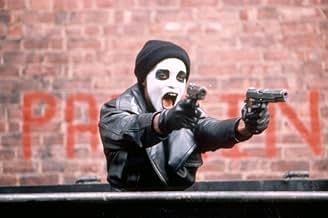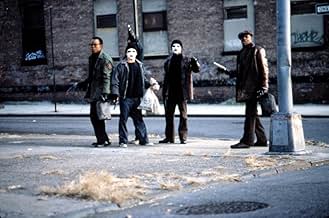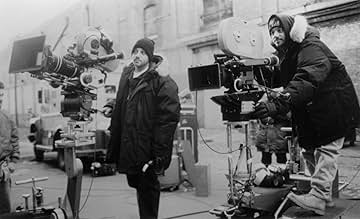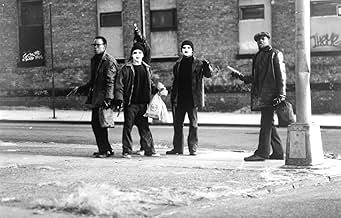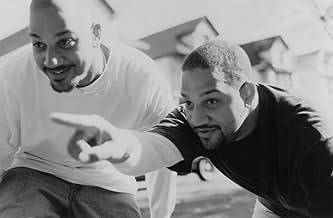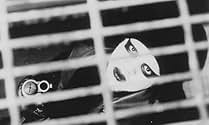ÉVALUATION IMDb
6,9/10
26 k
MA NOTE
Un vétérinaire vietnamien s'adapte à la vie après la guerre tout en essayant de soutenir sa famille, mais la chance d'une vie meilleure pourrait impliquer des crimes.Un vétérinaire vietnamien s'adapte à la vie après la guerre tout en essayant de soutenir sa famille, mais la chance d'une vie meilleure pourrait impliquer des crimes.Un vétérinaire vietnamien s'adapte à la vie après la guerre tout en essayant de soutenir sa famille, mais la chance d'une vie meilleure pourrait impliquer des crimes.
- Prix
- 2 nominations au total
Terrence Howard
- Cowboy
- (as Terrence Dashon Howard)
Avis en vedette
Opening in 1969, in the South Bronx, we are introduced to protagonist Anthony Curtis and his friends who are talking about what they will do after they finish school. Anthony decides to sign up for service in the US Marines. While there he fights alongside some of his old friends and makes new ones. After four years serving his country he returns home and discovers life isn't easy for a young black man during an economic downturn. He gets a job but it doesn't pay much; his girlfriend, and mother of his child, is getting money from a pimp and his girlfriend's sister is in a radical militant group. When he loses his job he and his friends work with a local criminal to make one big score... to rob an armoured car taking used currency to be incinerated.
When I sat down to watch this I was expecting a fairly conventional heist movie; that is certainly what the DVD box implied... in fact that is only a very small part of the film. Rather than the conventional heist movie where the first half is the planning before the execution this is about the events that led a promising young man to turn crime. The early scenes serve to introduce us to Anthony and his friends; he clearly isn't a saint as we see him working for a local crook but he still volunteers and ends up fighting in Vietnam where he sees some very unpleasant things. The scenes set during the war are in turns exciting and disturbing but not entirely without humour. Back in the US the film captures the poverty of Bronx where there are few real opportunities for most people; and while not justifying it explains why some turn to crime or radicalism. When we finally get to the robbery it is well handled; exciting without being glamourous. The cast does a fine job; most notably Larenz Tate who excels as Anthony and Chris Tucker who brings humour to the proceedings, as his friend Skip, without going too far and feeling out of place. Overall I'd definitely recommend this; just don't expect a traditional crime/heist movie.
When I sat down to watch this I was expecting a fairly conventional heist movie; that is certainly what the DVD box implied... in fact that is only a very small part of the film. Rather than the conventional heist movie where the first half is the planning before the execution this is about the events that led a promising young man to turn crime. The early scenes serve to introduce us to Anthony and his friends; he clearly isn't a saint as we see him working for a local crook but he still volunteers and ends up fighting in Vietnam where he sees some very unpleasant things. The scenes set during the war are in turns exciting and disturbing but not entirely without humour. Back in the US the film captures the poverty of Bronx where there are few real opportunities for most people; and while not justifying it explains why some turn to crime or radicalism. When we finally get to the robbery it is well handled; exciting without being glamourous. The cast does a fine job; most notably Larenz Tate who excels as Anthony and Chris Tucker who brings humour to the proceedings, as his friend Skip, without going too far and feeling out of place. Overall I'd definitely recommend this; just don't expect a traditional crime/heist movie.
7d3ei
Chris Tucker is hilarious in this movie, he has great on screen charisma, and he speaks his lines very fluidly, as if he was improvising. Larenz Tate is great as well, being able to pull off the young version of his character, since he has a boyish face. And Bokeem Woodbine reminds me of Samuel L. Jackson in this movie. The cinematography is also great and so is the acting overall. Like everyone says, its not so much as a heist movie, but a reflection on the hardships of the black individual, such as finding work and drug abuse; after fighting a war that wasnt really meant for them or their country.
Albert and Allen Hughes direct, produce and co-write (with Michael Henry Brown) this tale about Anthony Curtis (Larenz Tate), a South Bronx boy who goes off to fight in Vietnam, to then return after his tours of duty to find things just aren't the same anymore. The follow up to their incendiary debut, Menace II Society, the Hughes brothers deliver another in your face picture that is quite frankly on a perpetual downer. This is no bad thing, though, as long as you are not looking to be cheered up.
That's Uncle Sam for you! Mean Green.
The pic very much harks back to the glory days of film noir in the 40s and 50s, where some talented film makers began to tell stories of returning war veterans finding what they left behind is now alien to them - with some characters, as is the case here - deeply scarred by their experiences. Add in some gangster elements and the coup de grâce that is the scintillating heist, and clearly the brothers have seen many an old classic film. That the narrative is tried and tested stops the piece hitting greater heights, this in spite of some super acting (especially Tate and the always value for money Keith David) and the hard hitting violence that pierces the senses. Predictable yet potent, and certainly memorable, it's well worth a look for the tough of mind and the classic era film of heart. 7/10
That's Uncle Sam for you! Mean Green.
The pic very much harks back to the glory days of film noir in the 40s and 50s, where some talented film makers began to tell stories of returning war veterans finding what they left behind is now alien to them - with some characters, as is the case here - deeply scarred by their experiences. Add in some gangster elements and the coup de grâce that is the scintillating heist, and clearly the brothers have seen many an old classic film. That the narrative is tried and tested stops the piece hitting greater heights, this in spite of some super acting (especially Tate and the always value for money Keith David) and the hard hitting violence that pierces the senses. Predictable yet potent, and certainly memorable, it's well worth a look for the tough of mind and the classic era film of heart. 7/10
Gripping, poignant story about a young black man growing up in the 1960s Bronx whose parents groom him to follow in the footsteps of his college grad older brother. He has his own plans however, and enlists in the Marine Corps where he survives four years of brutal warfare in Vietnam. He returns home to try and make a new life for himself, but a struggling economy and lack of formal education gradually draw him into a life of crime. An effective portrayal of black involvement in Vietnam, with good performances, powerful scenes, and shockingly graphic violence. Tate is commanding in the lead, and Tucker a real surprise as his drug-addicted pal. Not for all tastes, but well-crafted and well-made. ***
Dead Presidents hammers home its point in its final scene, a quite brilliant and excruciating in its execution scene in the sense we may want these characters to get away with what they're doing. The scene is a heist, created between a handful of people who have come to know each other through the years and we have come to understand their predicaments. The finale sums up the sad, sad desperation some of the characters have had to resort to given their life and what has happened to them and captures how hard the times get when they get hard in the first place.
Dead Presidents is a crime drama; a social commentary and a war film all wrapped up in one. But this genre hybridity does not work against the film as much as it does compliment the epic feeling that we get when we recognise these characters have covered quite a fair distance. The film is Boyz in the Hood; Taxi Driver; Platoon and finishes it all off with a shoot out alá shortly after the robbery in Michael Mann's 1995 film 'Heat'. The finale stands out due to its jarring slow motion and attention to detail in how they have to go about their plan in brutal, violent, realistic detail each person is positioned and attacks a victim with a certain weapon in a certain way and focuses on a certain part of the victim. The shootout stands out due to its inclusion in what has been, so far, a film that avoids massive shoot outs and lashings of violence in a steady and careful study of an African-America man in a crisis.
The study behind Dead Presidents is intriguing and it's a study of maturity and coming to terms with responsibility. The film has its characters eventually resort to particularly desperate measures in order to merely live but does a good job in not glamorising these means. The primary focus here is the character of Anthony Curtis (Tate), a young African-American in the late sixties hanging around with his other young friends Jose (Rodríguez) and Skip (Tucker) all of whom are about to finish their education and hopefully enter some sort of employment. The setting up of the film is unspectacular but deliberately so; the kids hang out, get high and attend parties. But it is two things that click lead Anthony into his coming of age tale; they are the impregnation of Juanita (Jackson) and the volunteering to go to Vietnam to fight the cause for America in the war.
These two events will shape the character upon his arrival back to The States and it's through the pathetic, immature activities that occur at the very beginning that we will get a feel for how far Anthony has come along as a human being when the going really gets tough later on before, as I said, desperation kicks in. These tough times revolve around balancing a family that he has created as well as dealing with his Vietnam experiences in which he witnessed all the atrocities you'd associate with the war.
The film's opening third is teasing just as it is entertaining. It threatens to head down a route of crime complete with African-American gangsters hanging out in pool halls, taking rides with one another and getting into scraps; be it with one another over a hustle or Kirby (David), perhaps the fiercest criminal of this opening third, battering someone of a third party nature with his prosthetic leg because they owe him money. But the film never becomes stonewall in its genre and doesn't resort to clichés. It presents Anthony with a series of choices at a delicate time in his life but they are little choices such as 'Does he take the potentially ominous ride with Kirby into the unknown?' as Kirby goes to settle a score and how does he react to first seeing a gun and the potential danger that could spawn.
These are choices and scenarios that will prepare Anthony for larger, more important decisions. The scenes and scenarios are nothing we haven't seen before in the respective genre but they're still required for Anthony's maturing process. Once in the military, the film again threatens to break into genre and Anthony is faced once again with choices to do with whether he excepts the Euthanasia plea from a dying soldier guns and death and general darkness remain in his life and are the subject of a lot of his life experiences. But it's when Anthony returns to New York that a study kicks in. As a character, he has matured through experience and cannot seem to get on with his girlfriend Juanita who's now a mother after his tours of duty. The film feeds off Vietnam as a war which disables its lone individual from re-fitting into society in the snug, immature manner in which he could prior to the event.
Dead Presidents contains a fair number of good scenes and its reference to Taxi Driver as a study of America more observant and concerned with what's going on in a small, Asian country many miles away when home and its own people are in an equally nasty mess (New York, yet again) is interesting. Anthony's struggles with employment and family life as well as the pimp that helps out with money and just wants to be friends acts as a highlight that he cannot even get re-acquainted all too easily, no matter how criminally minded the person is and no matter how much they might have had in common had they met prior one of them going off and fighting for one's country.
Dead Presidents is a crime drama; a social commentary and a war film all wrapped up in one. But this genre hybridity does not work against the film as much as it does compliment the epic feeling that we get when we recognise these characters have covered quite a fair distance. The film is Boyz in the Hood; Taxi Driver; Platoon and finishes it all off with a shoot out alá shortly after the robbery in Michael Mann's 1995 film 'Heat'. The finale stands out due to its jarring slow motion and attention to detail in how they have to go about their plan in brutal, violent, realistic detail each person is positioned and attacks a victim with a certain weapon in a certain way and focuses on a certain part of the victim. The shootout stands out due to its inclusion in what has been, so far, a film that avoids massive shoot outs and lashings of violence in a steady and careful study of an African-America man in a crisis.
The study behind Dead Presidents is intriguing and it's a study of maturity and coming to terms with responsibility. The film has its characters eventually resort to particularly desperate measures in order to merely live but does a good job in not glamorising these means. The primary focus here is the character of Anthony Curtis (Tate), a young African-American in the late sixties hanging around with his other young friends Jose (Rodríguez) and Skip (Tucker) all of whom are about to finish their education and hopefully enter some sort of employment. The setting up of the film is unspectacular but deliberately so; the kids hang out, get high and attend parties. But it is two things that click lead Anthony into his coming of age tale; they are the impregnation of Juanita (Jackson) and the volunteering to go to Vietnam to fight the cause for America in the war.
These two events will shape the character upon his arrival back to The States and it's through the pathetic, immature activities that occur at the very beginning that we will get a feel for how far Anthony has come along as a human being when the going really gets tough later on before, as I said, desperation kicks in. These tough times revolve around balancing a family that he has created as well as dealing with his Vietnam experiences in which he witnessed all the atrocities you'd associate with the war.
The film's opening third is teasing just as it is entertaining. It threatens to head down a route of crime complete with African-American gangsters hanging out in pool halls, taking rides with one another and getting into scraps; be it with one another over a hustle or Kirby (David), perhaps the fiercest criminal of this opening third, battering someone of a third party nature with his prosthetic leg because they owe him money. But the film never becomes stonewall in its genre and doesn't resort to clichés. It presents Anthony with a series of choices at a delicate time in his life but they are little choices such as 'Does he take the potentially ominous ride with Kirby into the unknown?' as Kirby goes to settle a score and how does he react to first seeing a gun and the potential danger that could spawn.
These are choices and scenarios that will prepare Anthony for larger, more important decisions. The scenes and scenarios are nothing we haven't seen before in the respective genre but they're still required for Anthony's maturing process. Once in the military, the film again threatens to break into genre and Anthony is faced once again with choices to do with whether he excepts the Euthanasia plea from a dying soldier guns and death and general darkness remain in his life and are the subject of a lot of his life experiences. But it's when Anthony returns to New York that a study kicks in. As a character, he has matured through experience and cannot seem to get on with his girlfriend Juanita who's now a mother after his tours of duty. The film feeds off Vietnam as a war which disables its lone individual from re-fitting into society in the snug, immature manner in which he could prior to the event.
Dead Presidents contains a fair number of good scenes and its reference to Taxi Driver as a study of America more observant and concerned with what's going on in a small, Asian country many miles away when home and its own people are in an equally nasty mess (New York, yet again) is interesting. Anthony's struggles with employment and family life as well as the pimp that helps out with money and just wants to be friends acts as a highlight that he cannot even get re-acquainted all too easily, no matter how criminally minded the person is and no matter how much they might have had in common had they met prior one of them going off and fighting for one's country.
Le saviez-vous
- AnecdotesAll police officers depicted in this movie are from the fictional 53rd Precinct, the setting for Car 54, Where Are You? (1961) and Baretta (1975).
- GaffesIn the scene where Skip dies in his apartment, you can see him still breathing on the chair.
- Autres versionsCriterion laserdisc version includes additional scenes originally deleted before the theatrical release.
- Bandes originalesI Was Made To Love Her
Written by Lula Mae Hardaway, Stevie Wonder, Henry Cosby & Sylvia Moy
Performed by Stevie Wonder
Courtesy of Motown Record Company, L.P.
By Arrangement With Polygram Special Markets
Meilleurs choix
Connectez-vous pour évaluer et surveiller les recommandations personnalisées
Détails
- Date de sortie
- Pays d’origine
- Langue
- Aussi connu sous le nom de
- Dead Presidents
- Lieux de tournage
- sociétés de production
- Consultez plus de crédits d'entreprise sur IMDbPro
Box-office
- Budget
- 10 000 000 $ US (estimation)
- Brut – États-Unis et Canada
- 24 147 179 $ US
- Fin de semaine d'ouverture – États-Unis et Canada
- 7 943 778 $ US
- 8 oct. 1995
- Brut – à l'échelle mondiale
- 24 147 179 $ US
- Durée1 heure 59 minutes
- Mixage
- Rapport de forme
- 2.35 : 1
Contribuer à cette page
Suggérer une modification ou ajouter du contenu manquant

Lacune principale
By what name was Les billets verts (1995) officially released in India in English?
Répondre

